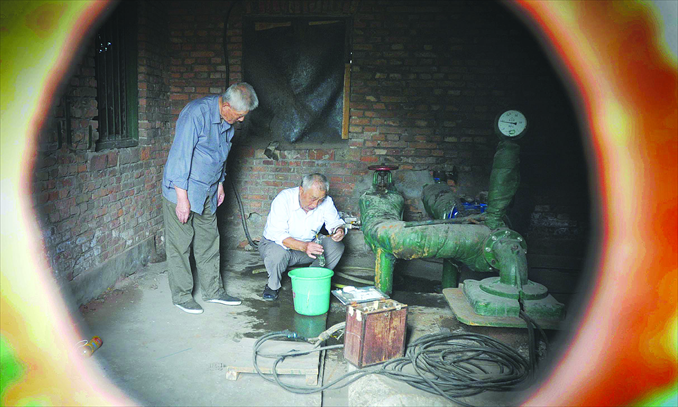Are earthquake ‘forecasters’ the reckless rumormongers?

On the evening of April 18, Xu Shubin was walking near his home when he spotted some clouds that led him to believe an earthquake was imminent. He quickly took pictures of them and posted them on his microblog, predicting a 7.0-magnitude quake would hit western China within 36 hours.
The veteran meteorite collector in Linyi city, East China's Shandong Province, posted corresponding satellite cloud images from the national meteorological center and called on Web users to further locate the clouds together. His call was met with skepticism and a lack of any constructive ideas.
Thirty-eight hours later, a 7.0-magnitude quake hit Lushan county in Southwest China's Sichuan Province, resulting in around 200 deaths.
Xu's original prediction on Weibo then drew over 8,500 comments in a short period, with many calling the amateur earthquake researcher a "master," though he did not predict the location completely accurately.
This was not the first time Xu had "made a scoop." On the night of May 9, 2008, less than three days before the deadly Wenchuan earthquake, also in Sichuan, Xu told netizens that he saw large "earthquake clouds" in Linyi, predicting "a strong quake would happen in one or two days," but was not sure where.
The unexpected rise in the number of amateur earthquake forecasters has further undermined the reputation of the nation's seismological authorities, which have been lambasted as an organ specializing only in "dispelling rumors."
Though earthquake forecast efforts from the masses have been historically encouraged, antagonism between government-backed professionals and grass-roots talents has grown. Furthermore, prospects for effective cooperation between the two sides remain bleak.

Diversity of masters
Xu began independently researching earthquakes in 2007 by observing so-called "earthquake clouds," combining them with satellite cloud images and geomagnetic indexes.
The difficulty in matching earthquake clouds with official satellite cloud images has impeded the accuracy of Xu's predictions in terms of location. "But considering my current technical conditions, (my predictions) have been relatively successful," the man in his 50s told the Global Times. He is proud of his prediction of the strong quake that hit Qinghai in April 2010 the day before it struck, though he failed to precisely locate the area in Yushu.
Xu is now one of the most widely-recognized amateurs in this field, and now has over 140,000 Weibo followers. Using different methods, another young man has also shot to fame in the cyber world with some "successful" achievements.
Lin Long, a 19-year-old student, leads a 49-member team that explores geomagnetic and ionospheric data as well as other related indices from both Chinese and foreign professional websites.
"We are all earthquake forecast enthusiasts from around the country and we routinely hold video conferences to exchange our findings and ideas," Lin told the Global Times. Their predictions of worldwide quakes are released on a Weibo account.
One of the major "battles" that made their name took place on April 14 when they warned that a 5.0-magnitude shallow-focus earthquake would hit southwestern Dali in Yunnan Province within 72 hours. On April 17, a quake of that magnitude hit northern Dali.
The prediction amazed the public, but authorities were not so enthusiastic. Zhang Junwei, spokesman for the Yunnan earthquake bureau, said it was illegal for any individual or grass-roots organization to release earthquake forecast information, and urged the public not to believe such information, the Beijing News reported.
Science or pseudoscience?
Because the majority of seismic officials insist that earthquakes cannot be predicted, such "achievements" by enthusiasts without professional backgrounds have unavoidably led to controversy.
In response to the increasing popularity of civilian forces, some geology majors have dismissed forecasts made by people like Lin as nothing more than "pseudoscience" that are full of contradictions and inaccuracies.
Some Web users also ridiculed these "breakthroughs" as being like lottery tickets - anyone will eventually get lucky after thousands of attempts - saying that some so-called masters were just taking advantage of major quakes to seek fame.
Lin said many "enthusiasts" were indeed trying their luck, but stressed that about 50 percent of their predictions had been accurate, with most having occurred overseas.
Sun Shihong, a researcher at the China Earthquake Networks Center under the China Earthquake Administration (CEA), said both the government's and grass-roots methods have their own merits and flaws.
"Earthquake forecast is still in a phase of gradual exploration. We should encourage diverse thinking," Sun told the Global Times, noting that anyone committed to this cause should stick to a basic principal - pursuing truth in a rigorous manner.
Exploring the field of earthquake prediction has never been a monopoly of the experts. Back in the 1970s, when China was struck by several devastating earthquakes, the central government advocated the participation of both professionals and the masses in monitoring earthquakes.
To date, methods like observing earthquake clouds have yet to be officially acknowledged as scientific. In view of the controversies surrounding these special techniques, Xu cited a famous saying by former leader Deng Xiaoping that it didn't matter whether a cat was black or white, so long as it caught mice.
Almost all these amateurs claim they are doing this out of personal interest and hope their efforts can help the public. But for them, this is far more than a simple hobby, often met with unexpected obstructions.
Lin said the Weibo accounts of his team have been repeatedly blocked, once on March 15 and again on April 22. Local police have also talked to him, telling him to cease attempting forecasts of earthquakes.
Such administrative interference may make sense against the backdrop of fabricated predictions of major earthquakes having caused widespread panic in the past. But Xu said authorities' inaction is partly to blame for such rumors.

Absence of government role
The emergence of grass-roots "experts" further mirrors the public's growing dissatisfaction with earthquake administrations at all levels. Amid the tragedy in Lushan, a new debate on the significance of such organs emerged.
He Bing, a law professor at the China University of Political Science and Law, also an active Weibo user, pointed out one day after the Lushan earthquake that it was a mistake to set up earthquake bureaus as they are unable to make effective forecasts despite the abundant resources at their disposal.
"To avoid legal liability resulting from incorrect predictions, they would rather keep silent and attribute their nonfeasance to technical obstacles," He said in his Weibo.
In August 1971, the NEA was officially set up and brought under the management of the Chinese Academy of Sciences. Four years later, its status was raised to an agency directly subordinate to the State Council.
The administration was once hailed by the public, and even the international community, after it was reported to have successfully predicted a 7.3-magnitude earthquake in Haicheng, Northeast China's Liaoning Province on February 4, 1975, avoiding great losses. The achievement was hailed as a "miracle" around the world, but remains disputed to this day.
However, the center was then quickly lambasted for failing to forecast the deadly earthquake in Tangshan, Hebei Province on July 28, 1976, which caused more than 240,000 deaths. After the Wenchuan quake in 2008, people's confidence in it almost hit rock bottom.
People complain that the earthquake administration has become a huge bureaucratic body that has to spend a lot of money to support its massive number of staff members and retirees, leaving only a small portion of State funds for what they believe is the "most important" task: life-saving earthquake forecasts.
On April 19, the NEA released its budget for 2013.
While a big chunk of the more than 4 billion yuan ($652 million) budget will go to monitoring and communication networks, only about 38 million yuan was specifically allocated for earthquake forecasts, while more than 150 million yuan was set aside for housing projects for their staff, immediately prompting widespread criticism.
He Bing suggested that earthquake administrations at all levels be closed down and substituted with research institutes. Meanwhile, the government should allow and support forecast attempts by individuals or grass-roots organizations.
Sun said it's understandable that the public strongly resents the earthquake authority considering its overall performance in recent years.
"After the Wenchuan earthquake, the authority stressed that earthquakes can't be predicted instead of reflecting on what it could do to make improvements," he said.
Gao Jianguo, deputy secretary-general of the China Association for Disaster Prevention, agreed that it's still difficult to make forecasts at present, but said the government can invite enthusiastic amateurs to participate in medium and long-term monitoring, which is also helpful in preventing mass casualties and losses.
"The government should first affirm the efforts made by non-professionals rather than throw cold water on them," said Gao, adding that antagonism continues to simmer between the two sides, as authorities have not done a good job of incorporating grass-roots forces into the greater earthquake prevention campaign.
He also noted that non-government organizations and individuals should follow the law in releasing forecast information.
At this point, good cooperation between the government and civilian forces is not likely to happen soon.
"They believe they are the professionals and look down upon on us amateurs," Xu said.
Lin said he has tried to share his observations with the earthquake administration via Weibo but was ignored, and also believes there is no basis for any cooperation.
Firmly believing in his unique method, Xu said he plans to compile his findings into a report and submit it to the top leadership.
"If they can give me certain support for personnel, funds and technology, I am confident that I will be able to make remarkable progress on strong quake forecasts in the western region, in particular southwestern areas," he said.